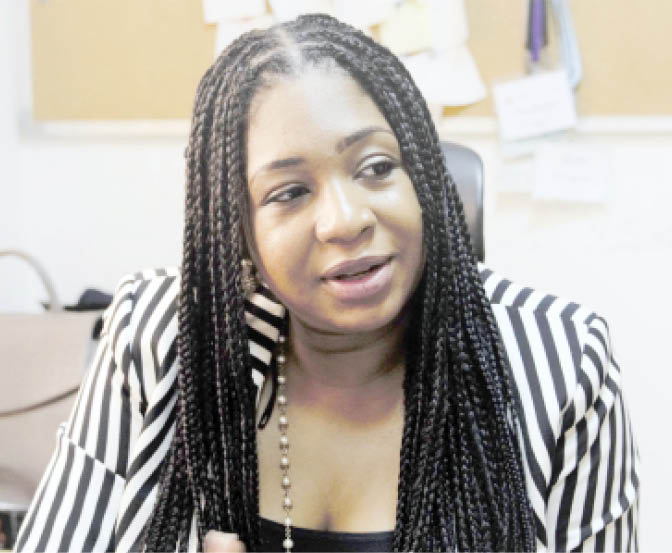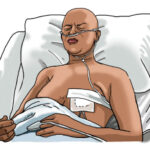Dr. Elima Jedy-Agba is the Coordinator of the International Research Center of Excellence (IRCE) of the Institute of Human Virology (IHVN) in Nigeria, and also the Principal Investigator of Feasibility and Acceptability of BRIDGE Study, an M-Health Intervention to Improve Breast Cancer. In this interview, she speaks on the development of an application aimed at tacking delays in accessing breast cancer diagnosis and treatment. She also bares her mind on ways of tackling the cancer burden in the country, among others.
What role do you think technology plays in tackling the burden of infectious and non-infectious diseases in the country?
Technology has a role to play in improving adherence providing information to patients. It also has a role to play in setting up support groups. For example, cancer patients or cancer survivor groups.
- Residents recount ordeals as gunmen kill scores in Benue
- Presidency: Southern govs offered no solution after banning open grazing
Studies have shown that over 70 per cent of people in Sub-Saharan Africa have mobile phones; that’s huge. That shows us that it is an important resource that we can tap into in our environment.
Mobile phone technology has been used for both infectious and non-infectious diseases. It does not just shorten delays, but has also been used in improving adherence.
So using mobile technology is here to stay and is really an important resource that can be used in improving health outcomes in Nigeria.
IHVN has done a lot of work in that area, where we have reminders sent to people living with HIV to come for their medication.
Mobile technology can also be used to provide healthcare emergencies. There are applications that I know that can be used. For instance if there is an emergency at home, you can find a doctor within that locality who can promptly visit the patient at home , and provide some medical care.
Breast cancer is one of the major cancers affecting women in Nigeria and globally. What is the focus of the BRIDGE study, and why are you conducting it?
The 2020 GLOBACAN report – which gives global cancer statistics – indicated that there were over 100,000 breast cancer cases in Sub-Saharan Africa.
In 2020, we found that breast cancer has overtaken cervical cancer as the most common cause of new cancer cases for women , and the most common cause of cancer deaths; which wasn’t the case two years ago.
The International Agency for Research on Cancer (IARC) has also reported that one in four cancers globally are breast cancer.
Many women also present at very late stages for cancer treatment. There are four stages of breast cancer; and the survival for breast cancer really depends on the stage at which women present at a health facility.
So if you present in stages one and two, there is almost more than 90 per cent chance of survival, but if you present in stages three and four, the percentage decreases by almost half.
In the Western World we see that lots of their cases are presented in stages one and two, and that is why their mortality rate is very low and lots of them go on to survive.
However, in Sub-Saharan Africa, a recent study revealed that over 70 per cent of women presented in stages three and four.
From the time a woman discovers a breast cancer symptom to when she makes that conscious decision to seek care for that cancer is a very long period of time.
Essentially, timely intervention is critical to improving survival from any cancer; not just breast cancer, and reducing morbidity and mortality.
That brings me to why we are doing the BRIDGE study. The study is geared at developing an intervention to shorten that delay period and hope that if that period of delay is shortened, women will present their cases at an earlier stage where they are more likely to survive from breast cancer.
The study is funded by a grant gotten from the CONQUER Cancer Foundation from the American Society of Biblical Oncology (ASCO).
It is an international innovation grant where they fund research in low and middle-income countries, like Mexico and some other countries in South America, not just Sub-Saharan Africa.
Essentially, the study has three primary objectives, and the objectives are to develop a no-cost mobile help application. This app will help provide education on recognising the symptoms of breast cancer, how a clinical breast exam can be performed and then referring patients for further diagnostic work.
The second objective of the study is to build local capacity by training community healthcare workers to act as patients’ navigators using this BRIDGE app that we have developed.
We hope that if community healthcare workers who are the first line or contact to a lot of women in rural areas are trained to be able to identify symptoms and refer the women promptly, it will reduce delays.
The third objective is to implement the BRIDGE study using the bridge application to shorten the diagnostic period , and then also assess how feasible and accessible the BRIDGE application is in Nigeria.
It is a one-year study. We developed the BRIDGE application, collaborating with the Seam Health Group here in Nigeria and the Department of Global Health Informatics at the Mount Sinai Hospital in New York in the USA.
We are currently piloting the app at six Primary Healthcare Centres (PHCs) in the Federal Capital Territory (FCT) in Gwagwalada Area Council.
Three of the PHCs are the intervention arm where we are using the application to see if it will help in shortening the delay period. Then the other three are the control arm of the study where we are not using the BRIDGE application. We are just allowing them do their regular referral and then we are trying to see if there is a difference.
While in one arm, healthcare workers are using the BRIDGE app, in the other arm of study, nothing is being used, and we are to see if the women that present at these two category of centres are able to seek care at the referral centre.
How does the app work for someone who has come down with breast cancer?
There are patient delays and health system delays in accessing cancer care. The patient delay is from when a woman first recognises the symptoms to when she makes that first contact with the healthcare system.
Then the provider delay or healthcare system delay is from when she makes that first contact with the health system to when she gets that first diagnosis of breast cancer.
The app is actually targeting provider delay. How soon it will take her to get the diagnosis after first contact with the healthcare system, because that delay may be so long because women visit multiple providers like traditional healers; and a lot of places.
For example, if the woman comes with a breast lump or nipple discharge, they know that the woman needs to be seen at the referral hospital, which is the University of Abuja Teaching Hospital (UATH), within a month.
At the centres where they are not using the app, they may just send the women away without follow up as to whether they go to the teaching hospital or not. But with the app, once they register that woman, automatically the nurse at UATH receives an alert to say that this woman is supposed to be coming, so an appointment is immediately scheduled for her with the surgeon at UATH.
What are some of the key findings so far that hold promise in addressing cancer challenges in the country?
A key finding is that the BRIDGE app actually works and is useful in shortening the delay period.
Community health workers are also excited about the app because it is user-friendly.
Also, previous studies show that women spend about five to eight months just roaming from one place to the other, but with this app now, it has really shortened that period. Within one to three months at most, these women are able to see a surgeon at UATH, and they are then given appointment to get a biopsy done.
Can you briefly tell us how government, stakeholders and the public can reduce the cancer burden in Nigeria?
Incidentally, I made a presentation on the BRIDGE study during the African Cancer Webinar series that was organised by Harvard University two weeks ago.
They were surprised to hear that cancer care in Nigeria is paid for out-of-pocket. For example, in countries like Uganda, the government pays for cancer care. At least they pay for that initial biopsy and surgery, then the patient can now pay for radiotherapy. Cancer care is not cheap.
In Nigeria, the entire thing is the responsibility of the patient; so that really contributes to delay. The patient may make the initial contact, get a diagnosis and get stuck when it is time to pay for surgery.
Two years ago, on the World Cancer Day, the government mentioned that it would include cancer care into the National Health Insurance Scheme (NHIS). This hasn’t been implemented yet, so that will be a key area if the government can at least subsidise cancer treatment; it will help improve outcome.
Also, funding of research is very important. This study I am talking about is funded by the CONQUER Cancer Foundation, but if there is also some funding kept aside for cancer research in Nigeria, you can have more people come up with ideas that can be useful in improving the cancer control strategy of the Ministry of Health.
Findings from studies like this can really feed into the strategies for cancer control.
For patients, there is still need for a lot of awareness creation, so that they can make that first step to accept to get screening for cancer, and also to seek care when they notice that they have any symptoms that are abnormal.

 Join Daily Trust WhatsApp Community For Quick Access To News and Happenings Around You.
Join Daily Trust WhatsApp Community For Quick Access To News and Happenings Around You.


